Turkey charges four Syrians over boat deaths as journalists flock to 'migrant beach'
BODRUM - Reuters

Syrian boys look at a copy of Turkish daily Hürriyet which carries a picture of three-year-old drowned Syrian boy Aylan Kurdi in its headline, in the resort town of Bodrum, Turkey, September 4, 2015.
REUTERS/MURAD SEZER
Days after the world's conscience was shocked by the image of a dead toddler washed up on a Turkish beach, the only thing holding back more Syrian refugees from attempting the same crossing was a media frenzy of journalists crowding the shore. Meanwhile, a Turkish court has remanded in custody four Syrians over the deaths of at least 12 migrants, including the three-year-old Aylan Kurdi.
"We saw the picture of the baby, (but) we have no other chance," says 36-year old Abdulmenem Alsatouf, a father of three children who once ran a supermarket in the Syrian city of Idlib.
As a Turkish court charged four alleged Syrian smugglers in connection with the three-year-old's death, Alsatouf was one of thousands of migrants waiting for their chance to brave the 4 km (2 miles) of water to the Greek island of Kos.
The nocturnal crossing, from the Turkish resort of Bodrum, is just one perilous leg of a journey for which smugglers charge thousands of dollars.
"We can't go back to Idlib, and there is no job for us in Turkey. I want to go to Germany but Sweden, Belgium, they are all fine. We are going to go to Kos in a few days," he added.
The Turkish coastguard said it stopped 57 people in three boats on Sept. 3 night. But that is a tiny fraction of the 2,000 migrants a day that aid groups say have been reaching Greece.
Harrowing images showing the tiny body of Aylan Kurdi lying face-down in the surf near Bodrum have jolted European governments and put a human face on the crisis. His five-year-old brother Galip and mother were also among at least 12 who died from a group of 23 on two boats.
But those planning to make the journey say they already know the odds. The United Nations refugee agency estimates more than 300,000 people have used dangerous sea routes to reach Europe this year alone, with around 2,500 lost at sea.
"I know the trip is dangerous, these deaths didn't start with the toddler, many people have drowned," 22-year old Mohammad Shaar said as he waited for his chance to cross.
"If European policies were not so brutal, our people wouldn't have died in the sea. These people are obliged to make that trip, there is no other way for us."
Suspects charged over deaths
The four Syrians, charged with smuggling migrants and causing multiple deaths by "conscious negligence" in connection with the drowning of the group including Aylan Kurdi and his brother, were remanded in a Turkish prison.
They had appeared in handcuffs at a courthouse in Bodrum in connection with the voyage. The mother of one of the suspects, Meliha Recep, insisted her son was not a smuggler but himself a migrant.
"They did nothing, they were just trying to escape. Our children are also victims. They were just on the same boat, that's all," Recep, dressed in a gray headscarf, told reporters.
Turkey says it is trying to stem the flow of migrants leaving its shores. Of the 57 Syrian, Afghan and Pakistani migrants detained on Thursday evening, those that have identifying documents and are not from Syria will be deported back to their country of origin, authorities said.
The rest will remain in Turkey, which already hosts 2 million Syrian refugees and has borne much of the brunt of the humanitarian fallout from the four year civil war in neighboring Syria, at a cost of $6 billion.
Life-jackets become new business
With infrastructure buckling and work permits difficult to come by, Turkey's Aegean coastline has become a key jumping-off point for refugees hoping for permanent homes and a better life in Europe.
A woman named Ayşe was selling life-jackets to migrants in Bodrum, a trade she said had replaced her usual income selling silver trinkets to tourists.
Hers were genuine, she said, but other life jackets on sale in the town for half the price were dangerous fakes: "They pay thousands of dollars to make the trip and don't care to pay $10 more to buy real life vests for their kids, that's very sad."
Speaking at a meeting of G20 finance ministers his country hosted on Sept. 4, Turkish Prime Minister Ahmet Davutoğlu said Turkey would continue to welcome refugees, and other countries should do more to help keep them safe.
"Let that body (of Aylan) become a warning signal for all of us. If Syrian children are not safe, no children are safe in their homes in Ankara, Paris or New York. Those children didn't decide where they would be born. It is their destiny. But it is our decisions that will determine their future."
Abdullah Kurdi, the father of Aylan and Galip, returned on Sept. 4 to Syria to bury them in the ravaged border town of Kobani, which was largely destroyed by bitter fighting between Islamic State of Iraq and the Levant (ISIL) and Kurdish militants since last year.
An emotional Kurdi wept as his sons and wife were laid to rest, and also called on Arab governments to do more to alleviate the refugee crisis.
